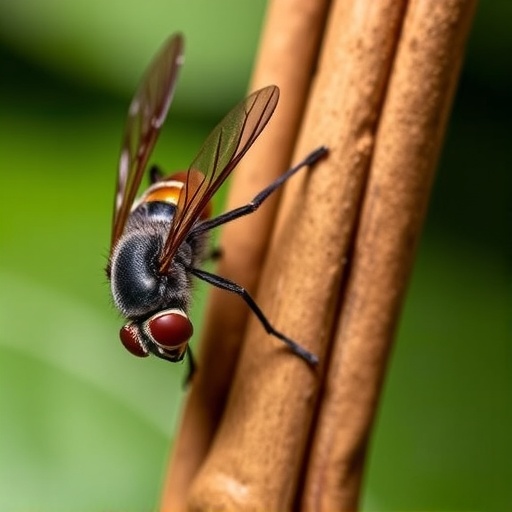In recent scientific investigations, the focus on the sublethal effects of natural substances on pest species has gained significant traction. Among these investigations, the research conducted by Alghamdi, Naqqash, Batool, and their colleagues shines a light on the impact of cinnamon extracts on the common housefly, Musca domestica. The findings are not merely academic; they hold potential applications in agricultural practices and pest management. This study offers a rare glimpse into how a conventional spice, often found in kitchens across the globe, can disrupt the biological functions of a ubiquitous pest.
The study meticulously assesses the sublethal effects of cinnamon extracts on Musca domestica. Traditionally viewed through the lens of culinary use, cinnamon has now emerged as a promising contender in pest control strategies. The researchers designed experiments to explore how different concentrations of cinnamon extracts influence the behavior, reproduction, and overall vitality of houseflies. The implications of these findings extend beyond simple pest management; they touch on eco-friendly and sustainable approaches to agriculture, potentially reducing reliance on chemical insecticides.
Additionally, the study delves into the molecular responses of houseflies when exposed to these extracts. By utilizing modern biochemical techniques, researchers were able to observe changes at a cellular level. One of the standout findings was how cinnamon extracts triggered stress responses in the flies. These stress responses are vital to understanding how pests might adapt to different environmental conditions, including the presence of natural pesticides.
The impact of cinnamon goes beyond mere toxicity; it appears to interact with the biological pathways of the houseflies in intricate ways. Researchers uncovered that cinnamon extracts can affect gene expression related to detoxification processes. It raises significant questions about how natural substances can be utilized to counteract the development of resistant insect populations prone to conventional pesticides. By understanding these molecular interactions, scientists can design more effective strategies that minimize resistance development.
Behavioral tests conducted during this research revealed significant changes in locomotor activity among flies exposed to cinnamon. Reduced mating success and altered feeding patterns were also observed, which further emphasizes the potential of cinnamon as a debilitating agent against Musca domestica. These behavioral changes could lead to reduced populations over time, providing an avenue for sustainable pest control.
The versatility of cinnamon extracts also presents an opportunity for integration into existing pest management programs. Integrative pest management (IPM) practices allow for a multifaceted approach to pest control, incorporating biological, cultural, and chemical methods. The utilization of natural extracts like cinnamon extends the toolkit available for farmers and pest managers seeking alternatives to synthetic pesticides.
Importantly, an aspect of the study that stands out is its emphasis on safety and environmental responsibility. With the increasing concerns surrounding chemical exposure, both for humans and wildlife, the use of cinnamon as a natural repellent could offer a safer alternative. Such strategies align with broader trends in agriculture that prioritize sustainability and ecological balance. The research provides compelling evidence that cinnamon not only deters pests but also does so while posing minimal risk to non-target species.
Moreover, the findings suggest a need for increased interdisciplinary dialogue between entomologists, agricultural specialists, and chemists. As the data reveal, understanding the chemistry of cinnamon and its interaction with biological systems is critical to harnessing its full potential. The study opens the door for further investigations into which specific compounds within cinnamon are most effective, as well as their mechanism of action.
The implications of this research extend globally. With Musca domestica being one of the most prevalent pests, its management is a significant concern worldwide. The findings of this study could stimulate further research and lead to enhanced pest control methods in various agricultural sectors—ranging from organic farming systems to integrated crop management approaches. Scaling the findings from local to global applications might manifest novel strategies that equip farmers with sustainable solutions tailored to their specific contexts.
As this discourse progresses, the study instigates broader discussions about the role of ethnobotanicals in modern pest control. It fosters a convergence of ancient knowledge with contemporary scientific inquiry, retracing the steps of agricultural practices that have endured through centuries. Cinnamon extracts, once revered for their culinary and medicinal properties, may find a new identity as a key player in pest management innovation.
In conclusion, the study’s influence may resonate beyond the immediate findings, inspiring a generation of researchers to explore natural alternatives to chemical pesticides. As awareness grows, so too does the expectation that scientists and practitioners will engage more deeply with the sustainability agenda. The forthcoming years may well witness a paradigm shift in how we approach pest dilemmas, guided by research that bridges tradition with innovation. This seminal work stands as a beacon for future inquiries into harnessing the power of nature for the betterment of agricultural practices.
In summation, the research presents an exciting intersection of food science, entomology, and environmental sustainability. The disruptive potential of cinnamon extracts on Musca domestica not only serves as a testament to the versatility of natural compounds but also lays a foundation for future studies. Engaging with these findings encourages a re-evaluation of existing pest management practices and heralds a new era of eco-conscious agriculture.
Subject of Research: The sublethal effects of cinnamon extracts on Musca domestica and their molecular responses.
Article Title: Sublethal effect and molecular responses of Musca domestica to cinnamon extracts.
Article References:
Alghamdi, A., Naqqash, M.N., Batool, N. et al. Sublethal effect and molecular responses of Musca domestica to cinnamon extracts.
Sci Nat 112, 50 (2025). https://doi.org/10.1007/s00114-025-01998-w
Image Credits: AI Generated
DOI: https://doi.org/10.1007/s00114-025-01998-w
Keywords: Musca domestica, cinnamon extracts, pest management, environmental sustainability, sublethal effects, molecular responses, natural pesticides.




